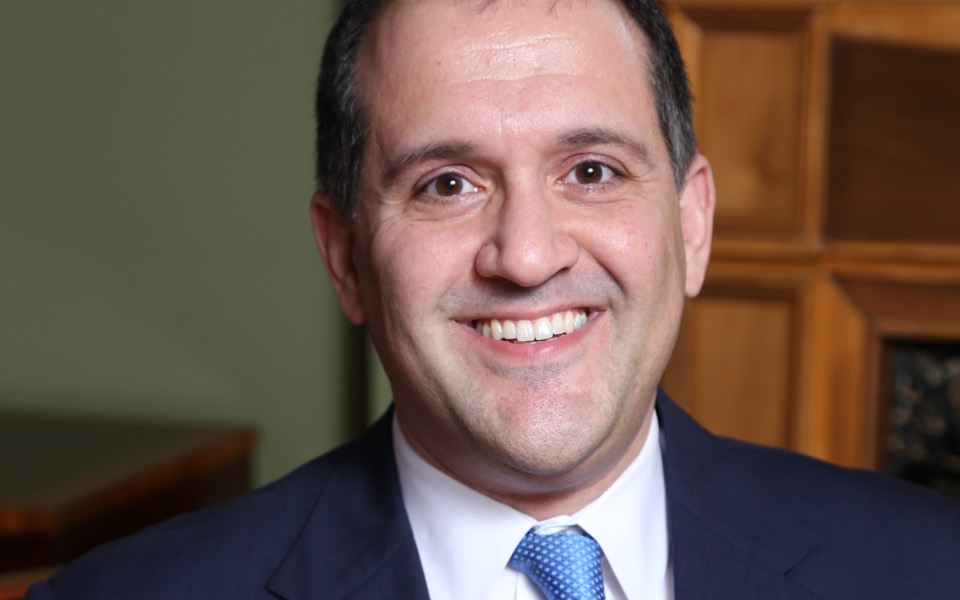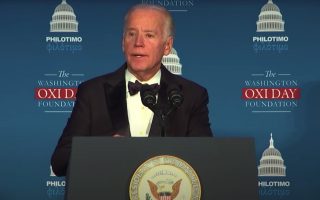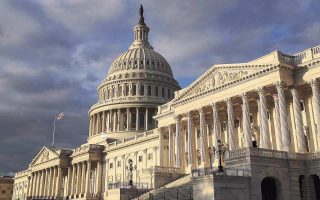Greece, Cyprus must make ‘realistic’ proposals to new US administration, says HALC chief

Joe Biden and his foreign policy team are more familiar with Greek issues than any other American administration in history, Endy Zemenides, executive director of the Hellenic American Leadership Council (HALC), tells Kathimerini.
Zemenides is regarded as one of the diaspora community’s most influential advocates, with inside access to the decision-making mechanics of Washington and excellent knowledge of the complex puzzle that comprises American relations with Greece and Cyprus, but also its approach to the broader Eastern Mediterranean.
He notes the many contacts the new president and his secretary of state and national security adviser had over the years with the Greek-American community, and calls on Athens and Nicosia to approach the new administration with well-formulated proposals that are bold yet realistic in order to have a better chance of being implemented.
With regard to US-Turkish relations, Zemenides stresses that the policy of appeasement and the “days of blank checks for the Erdogan regime are over,” though he does not see a complete rupture, but, rather, an effort to create a “positive agenda.” He also believes that the Biden administration will not stay quiet about Turkey’s destabilizing behavior in the Eastern Mediterranean and the Aegean.
He foresees America rejoining international initiatives for dealing with global problems such as climate change, underlining that Greece and Cyprus stand to benefit in this area if they bolster and promote their programs for renewable energy sources and make clear that energy diplomacy in the East Med that centers on natural gas is a bridge to a greener future.
Last but not least, the head of the Chicago-based HALC speaks of the deep divisions in American society, saying that the situation has deteriorated to the extent that many Republicans and Democrats will not even socialize anymore and even oppose their children marrying someone from the rival political camp.
What do you think the election result has done for America’s image around the world?
Judging by the reaction of much of the world, the election results are a relief. A difficult global environment has been made even more unstable by the United States’ failure to lead, the unpredictable turns this administration has taken, and the disdain President Trump has shown for international institutions and allies. Joe Biden was characterized as the candidate of “restoration” and that means a lot for democracies around the world who look to Washington for leadership and stability.
Are the divisions in American society as deep as they seem?
There is plenty of cause for concern. It was just a year ago that President Trump was predicting that his impeachment “will cause a Civil War-like fracture…”
Even more worrying, a Public Religion Research Institute/Atlantic poll in 2019 found that 35% of Republicans and 45% of Democrats would be unhappy if their children married someone from the other party. Those figures were at less than 5% in 1960. Americans are increasingly limiting their contact to like-minded partisans when it comes to social media, to what news they consume, even where they decide to live. If there is not some course correction, the divisions will become even more stark.
How close is our community to President-elect Biden?
The community has a long-standing relationship with the president-elect. Put the cute “Bidenopoulos” stories aside, and you will find a relationship of substance, not just photo-ops. There are plenty of examples from his time in the Senate, but let’s focus on specific acts when he was vice president. Joe Biden worked closely with the Greek Orthodox Church of America on the ecumenical patriarch’s 2009 visit to Washington – where he hosted an official dinner for His All Holiness at the vice president’s residence. This visit helped lay the groundwork for Turkey to grant Turkish citizenship to Greek Orthodox hierarchs, thus helping ensure patriarchal succession.
In 2014, when Vice President Biden took the lead on US policy on Cyprus, he met consistently with Greek-Cypriot Americans and the Coordinated Effort of Hellenes. The amount of meetings alone was remarkable, but what was discussed and how they led to a historic trip to Cyprus and his declaration of a “strategic partnership” between the US and Cyprus was even more so. And all these meetings introduced the community to Jake Sullivan, who will be the president-elect’s national security adviser.
He got involved with the economic crisis as well, right?
Yes. At the height of the Greek economic crisis, the White House convened a meeting with all of the diaspora’s major organizations to coordinate American support for Greece. Vice President Biden came to the meeting, and not just for a stop by. He sat with the community for over an hour and discussed specific policy options and next steps.
This year, we saw the depth of his support in the community – whether that be the political support he received from elected officials like Dina Titus, John Sarbanes, Eleni Kounalakis, Chris Pappas and Charlie Christ, to fundraising from Dennis Mehiel, Jim Chanos and George Tsunis. It is a close and long-standing relationship, one that good things have resulted from.
What should Greece and Cyprus expect from a Biden presidency?
They have greater familiarity with Hellenic issues – and Greek and Cypriot figures – more than any incoming administration in history. The Biden administration, the president himself, a Secretary [Antony] Blinken, a National Security Adviser Sullivan and others will not have a steep learning curve when it comes to Hellenic issues. This presents an opportunity, but a challenge as well. Do Athens and Nicosia know exactly what their “asks” are of a Biden administration? They have to extend beyond a general “Put pressure on Turkey” [or] “Help us economically.” This president’s inbox will be overflowing, and when Greece and Cyprus have the attention of the highest levels of the administration, they need to capitalize with requests that are ambitious enough that they make a difference but realistic enough that Washington can deliver.
What will his approach to Turkey be?
A very important question, as President Trump just pardoned Michael Flynn – his first national security adviser and Turkey’s unregistered agent. The days of blank checks for the Erdogan regime are over. I would not expect a full rupture of relations between Washington and Ankara, or at least not one precipitated by the Biden administration. And I do expect an attempt, like the one the EU has tried, to hold out the prospects of a “positive agenda.” But there will no longer be appeasement of Turkey on the S-400 issue, there will not be silence or ambiguous statements from the Biden administration when it comes to Turkey’s destabilizing behavior in the Eastern Mediterranean and the Aegean, Washington will no longer leave the fate of Syria, Libya or the Caucuses to be decided in negotiations between Russia and Turkey. One can also expect far more pointed and open criticism of Turkey’s democratic backslide and of human rights and religious freedoms violations within Turkey.
What about his broader priorities on the global stage?
International cooperation is going to be back at the top of the agenda. Restoring trust in US leadership will be right alongside it. The incoming administration has made it clear that human rights will also be a central focus of its foreign policy. And we should pay special heed to Biden’s commitment to dealing with climate change. This should lead Greece and Cyprus to emphasize their renewable energy plans and make clear that the natural gas part of Eastern Mediterranean energy diplomacy is a bridge to a greener future.
Will the vice president play a role in formulating policy?
Most certainly. The challenges the incoming administration faces are numerous and daunting. I expect that Vice President-elect [Kamala] Harris’ focus would be more on domestic affairs, but it bears watching who is going to be on her national security team and what she develops a particular interest in.
What is the significance of Biden’s national security nominations for Greece and Cyprus?
Just as is the case with Biden as president, no incoming secretary of state has had more familiarity and fluency with Hellenic issues than Antony Blinken. He has dealt with these issues as Senator Biden’s staff director on the Foreign Relations Committee, as Vice President Biden’s national security adviser, as President Obama’s deputy national security adviser and as his deputy secretary of state, and finally as the Biden campaign’s chief foreign policy adviser. He has met with Greek-American leaders over and over again in all those capacities for two decades, became a regular at the PSEKA Conferences, and has a deep friendship with the Greek community’s great partners at the American Jewish Committee.
Jake Sullivan also made quite an impression in his work with the community as Vice President Biden’s national security adviser. I am eagerly waiting to see who fills the other positions – especially assistant secretary of state for European and Eurasian affairs, but because of this national security team, there should be an expectation of the improved ties between Washington and Athens and Nicosia should take the next step.





